|

songs | interviews | photos | tours | boots | press releases | timeline
Alternative Press (US)
October 1999

Venus Envy
Can a mystical chanteuse from the school of hard knocks find true love and happiness while traveling at the speed of sound To Venus And Back? Randee Dawn stows away on Tori's latest trip and dishes the heart copy. Scenes of life on Venus by Lee Locke.
There's always the traveling.
As a musician, Tori Amos is keenly aware of that. As a musician who's made her home in the farthest reaches of southwest England, she knows it's at least five hours to London, eight more overseas to visit the record company (plus a time change), then all of that in reverse to get back to hearth and home: Martian Studios, Cornwall, where she lives with her husband of a year and a half, Mark Hawley. To say nothing of the touring.
That's a lot of moving around.
So chalk up Tori's attitude to becoming accustomed to perpetual motion, because on this fine June day she's traveled all the way into London, checked into her favorite Notting Hill private hotel, and with barely a pause has eagerly tackled her first interview in ages, promoting her forthcoming double CD, To Venus And Back. Unsurprisingly, the disc is about journeys both interior and exterior. Coming from one who spends as much time as Tori does moving from place to place, it makes sense.
"Everything seems to be moving so fast," Tori muses. "Tragedies seem to be moving so fast; almost before we are able to ingest one, another one happens. Information travels so fast - but I don't know if the heart adjusts that fast."
A bold statement from one whose heart's had to do a lot of adjusting over the years as Tori's learned how to anticipate life's twists and turns: From prodigal obscurity to her humiliating early days with the band Y Kant Tori Read, to her abduction and physical assault by a fan, to her Phoenix-like rise from despair with a rough gem called Little Earthquakes in 1992, to her first-trimester miscarriage, to her marriage to Hawley, to her success recording and touring with a backing band. On this particular stretch of highway the dividing lines have rarely remained unbroken, but the tight curves and potholes have shaped her, without a doubt, into the Tori Amos she is today. This one: small, wide-faced, burnt-orange hair, eyes gray and eagerly interested, standing before her interrogator in the lobby of her hotel and saying, "Should we get started?"
Always ready to keep moving, always prepared for the next signpost.
"She definitely is doing a million things at once," says Tori's drummer, Matt Chamberlain, who himself is living a charmed life - he was a fan before he ever started working with Tori on last year's From The Choirgirl Hotel. "I think she's really into having a whirlwind around her as far as doing a record, interviews, videos. I think she gets high off it. All I have to do is show up and play drums."
The whirlwind (and what a whirlwind it is; she's promoting her forthcoming album and tour months ahead of time, has had a she named after her by designer Steve Madden, and has appeared on a recent episode of MTV's Fanatic) and the musician settle down deep in the heart of Holland Park, surrounded by dazed Londoners, grassy fields, brick walls and the occasional peacock. The new album, Tori explains, is a kind of milestone because there is something special not only about the millennium approaching, but about the fact that it's been almost 10 years since she truly got her shit together and started writing/recording/forcing Atlantic to accept Little Earthquakes. A decade ago, "I had an amount of energy, like a fireball that was so amped there were times I would just burn myself up and become a cinder," Tori notes. "It took me a long while to really know how not to burn myself up. There is a self-righteousness that can come so much from a person's 20's. When I was 20, I was pretty self-righteous."
And while the years haven't exactly mellowed her, Tori says she's learned to be a little more accepting of other people's opinions. "I had my vegetarian need-to-convert stage," she says, laughing. "I think everyone does. But you can always find a glimmer of good yummy stuff that is rooted in some deep truth in a lot of these movements. The vegetarians have something to offer; the Earth First! People have something to offer; the Christians have something t offer. These days, I'm trying to be a better listener to other people's ways."
Still, all things being equal, Tori Amos is also a very good talker, whether in her lyrics or in her answers to an interviewer's questions. She carefully measures out what she's going to say in conversation, often leaving long pauses between words, as if searching for the right metaphor or allusion. But if it takes some time, that could be because Tori's first real language, like that of many musicians, is not spoken. It is played. And sung. "If we could express ourselves another way," says Tori, "we wouldn't be songwriters. I don't think you write songs because in your everyday living you express yourself exactly the way you want."
Meanwhile, however, a simple question - "Why the title To Venus And Back?" - will elicit a good half-hour's worth of dialogue, possibly with a few lyrics sung in between the sentences. Scintillating dialogue, of course, but it makes for a conversation that moves with the speed of a bill passing through Congress. For a little abbreviation: Originally, the two-CD set was to have been a mix of b-sides and live tracks, but Tori's engineer for her past three records, Marcel Van Limbeek, upon hearing her new music, helped put the kibosh on that. "Tori can come up with quite a lot of material all the time," he explains, "and I thought it would be more interesting to have a new album, rather than just the b-sides."
Tori's husband, and her co-engineer with Van Limbeek, Mark Hawley, agrees that once they had enough new tracks to justify a whole album, there wasn't much point in holding back the music. "The whole new album was so relaxed when we were recording it, the vibe was incredible. It sounds corny, but that comes through on the record."
Tori's take? "It felt like a changing of the guard with this record, so it was nice to have the older children there to see the new ones down the gangplank, or over the bridge," she notes, referring, as she often does, to her songs as people. And the title? The result of a good bottle of wine (Tori is quite the connoisseur, referring to her station in the music world as a "small-to-medium vineyard") and a healthy conversation with two friends. "I've been around the world seven times," says Tori, "and I'm always trying to go behind the heart, to that place where the unconscious lives. I don't think it lives in the brain; I think it is behind the heart. And one of the women said to me, 'Could you see yourself like a little astronaut? If you could, would you go to Mars?' And I said, 'Jesus Christ! Oh, no. Not me and Mars. Even though the studio is called Martian. That's all too male for me.' And the other woman said, 'You'd go to Venus, wouldn't you.' And I just looked up and said, 'That's it! To Venus And Back!' I can literally see Venus circling around her heart, seeing different perspectives."
Those perspectives, captured in songs like "Bliss," "Suede" and "Glory Of The 80's" [see sidebar], form a snapshot of where Tori is right now in her life. It's a place she's never been before, not it all of her years of traveling; a place called wedded bliss.
"Well," she hesitates, preparing to put it into words, "people started coming up to me and going 'You look really happy.' I would just be reading the paper, sitting there, going, 'I do?' And I don't want people to think it's an affair I'm having to put a smile on my face I just think that marriage has been this mystery adventure to me. It's really different than I thought it would be."
It may be a cliche, but occasionally those are cliches for a reason: Marriage, both to Hawley and, in a sense, to her band, has very much agreed with Tori. Hawley, however, won't go into it for the press. "The way we work is, I'm an engineer, and she's an artist. And our marriage is something that is totally private, and we do not discuss it. That's how we survive."
But it's hard not to connect the forthcoming release of an album about traveling around the heart, taking snapshots of different perspectives, of discussing love and singing about orgasms, to avoid the subject entirely. "I've lived with other men before," says Tori, "and I've been blessed in having some good experiences with men. I don't have this sense of failure about those relationships because we didn't 'make it.'"
For Tori, long-term survival has less to do with a successful relationship than with whether the two partners were enriched by the experience.
"The whole idea of failure is changing for me," she continues. "These relationships I had, there were gifts exchanged, and they weren't failures. In 20 years, if Mark and I want to move on and experience something else, that doesn't take away from what we have right now. For us a window opened. Us holding hands together. We jumped through it together, not alone, and went to a place I had never been before. Isn't that making it?"
"I'm more of a wild animal than a domesticated one - but that doesn't always mean I'm in attack mode."
"There are times I would just burn myself up and become a cinder."
"I'm not as quick to torment someone because of their beliefs."
There is, of course, a whole forthcoming double CD that has nothing to do with writing new material and traveling around the heart - half of Tori's next release will be a collection of live recordings taken from her Plugged '98 tour, when she was supporting From The Choirgirl Hotel. Going through a list of potential songs was no easy task, says Hawley. "They played something ridiculous, like 70 or 80 songs live, and you can't possibly put all of them on one album."
What ensued, even as the tour was in progress, was a re-listening to every song, which Hawley recorded on DAT each night. "Talk about throbbing jaws!" Tori winces, referring to her often-painful but unnoticeable facial-bone deformity, which she frequently soothes by holding a cup of coffee against it. "It's agony sometimes because you can hear how bad you really can get."
Hawley, Amos and Van Limbeek teamed up with the band and created a ranking system for the songs, from 1 to 4, with 4 being the highest, to prune the lousy versions. "There were, for me, for my performance, a lot of 1.7's," recalls Tori. "But we'd save the 3's and review them at the end."
"We all had to find a performance where we were all playing correctly," recalls drummer Chamberlain. "The versions of the songs we did live were different than on the record, which made them unique. 'Waitress,' for example, is a nine-minute space jam that's totally different from the version on the record. Tori wanted to have stuff on the live record that the live band transformed."
"Obviously, I have a bias for certain ones," asserts Tori. "'Bells For Her' needs to get on, because Marcel and I have a soft spot in our hearts for that one on this tour. And Mark has a soft spot for 'Space Dog.' Would I put 'Space Dog' on? Because I thought that performance worked, it got on, but originally, if you asked me is it my vision to have 'Space Dog' on? No."
Although few people would consider Tori to be dogmatic about controlling every aspect of her work, she has very confidently stepped up to the plate and made sure that things got done the way she wanted them to, almost from the start. She knew Little Earthquakes would sell, and she pushed it until the record company agreed. Now that she's sold comfortably well, yet is still considered something of an "underground" artist, she can essentially do and say and record whatever she likes. No one ever forced her to sign up a band, and no one insisted that a single woman playing a piano couldn't make it. (At least not since Tori proved them wrong.) Yet, starting with Choirgirl, Tori has learned to cede control, just a little bit, and let a band come into her life, a band that includes Chamberlain, guitarist Steve Caton (who has been with her since Y Kant Tori Read) and bassist Jon Evans. Giving them equal input in choosing songs for the live record may not have seemed like a major step to outsiders, but for Tori, it was.
"It's really inspiring to watch her do the business side of things," notes Chamberlain. "She fights to kill. When she wants something done - her songs are like her kids, and if you fuck with her music she gets pissed off, and rightly so. It's her life, her art, her career. Other artists would be like, 'Oh, you gotta compromise with the record company.' But Tori is writing her own rules, doing what she wants to do."
"I'm becoming more flexible," Tori says. "I'm not as quick to torment someone because of their beliefs. I'm realizing there are sides to me that are defiant, and there are sides that are non-conformist. I'm much more of a wild animal than a domesticated one - but that doesn't always mean I'm in attack mode. There's even a side to me that wants to sit on your shoulder and wants you to giggle when you're taking your exams."
Talk about changing your perspective. Certainly, the Tori Amos of yesteryear wouldn't have considered a tour with Alanis Morissette, a pairing that rings like the brainchild of a booker who doesn't know his ass from his elbow. ("Two former child-actress musicians playing pissed-off vagina music? Let's do it!") But according to Tori, this is no accident: Alanis called her to ask, and since Tori was free, she agreed to the "5 Weeks Tour," in which the lineup consists of an opening act, then Tori, then Morissette. "Obviously, if I didn't have respect for her and her work, I wouldn't be doing this," says Tori. "Whatever you feel about her music, she is one of the kind ones. She knows how to get the claws out, no problem, but she doesn't want a mud fight with another woman, and I don't want a mud fight either. We'd rather be happier for each other's differences and accomplishments and she's becoming a friend."
Still, Tori acknowledges that Morissette lives more "topside" than she does. "My goal is not to become more accessible," Tori asserts. "There is something to be said for not feeling that everybody has a piece of you. I'm much more contained, and I live in the underground a bit. That's a different world than when you walk topside. It's quite tricky to retain some sense of yourself and know that you haven't been commodified. When you have the kind of success she's had, you almost become a commodity on a stock exchange. It must be a strange feeling."
And change usually is.
There is one other stop, for now at least, on the road through Tori-land (a concept coined by Chamberlain, who is selling his apartment, moving, and preparing, as he says, "to go to Tori-land for the next couple of months. You go out to Cornwall, and you could be in the middle of Texas somewhere; you're in the middle of nowhere you're definitely on a different planet"). It's the one incident that may have affected Tori more than anything else along the route, because the incident, the miscarriage, came from within, and it was one of the few things she's been unable to have any control over.
Although it happened in 1997, and although she doesn't really bring it up unless asked, Tori clearly is still dealing with that particular loss. But has she come to terms with it? "I think I have," she says softly, now leaning back in the couch of her hotel suite. A long pause ensues. "And other times, I think about her. She was a little girl. But without her, I'm experiencing womanhood, not as a mother, not as a woman who feels empty. There really isn't the race for children at this point, because sometimes I think you have children to fill a need with dealing with your own lost childhood. And I've looked into that."
But does she have children planned for her future? Certainly all of the traditional requirements have been met: husband, home, comfortable living. "I think I would like to be a human mother," she says after some consideration. "But I've had to work through a few health issues that deal very much with being a woman. I'm working on it. When things are happening to you and you feel it's in you, you can't get to that; you can't buy a ticket to that. Your cells are mutating - stop! I'm trying to find ways to get to places I don't know how to get to, because I do think that something spurs the body to start imploding. And it affects your entire life."
What a long, strange trip it's been. Tori says she wouldn't like to think of the first decade of her professional recording career as a solid, separate block, book-ended by Little Earthquakes and To Venus And Back. Instead, she says, "I like to think of it as an arc. I like the shape of it better." She pauses to think. "I'm at the stage where I'm becoming fulfilled as a woman. Nothing special about it, no fireworks. But so much of the time you're the daughter of somebody, or the wife of somebody, or the mother of somebody - you're always trying to find the path from girlhood to partner-hood to adulthood and it's nice to have just womanhood. I'm enjoying walking down this particular road right now."
Which makes sense. Because as Tori Amos knows, it's never the destination that's important - it's the journey that makes the difference.
Notes: Hair by Jimmo Salako for Blunt. Make-up by Lesley Chilkes for Marina Jones. Styling by Karen Binns for Mandy Coakley. Denim suit by Preen. Pink leather jacket by Robert Carey-Williams.

~ ~ ~
Sidebar
A Space Odyssey
Tori offers a travel planner for select new songs on To Venus And Back.
Suede
"There's this moment in 'Suede' where [the narrator's] being called 'evil' by this other person because of whatever she's done to them in their minds. But there's this side of obsession and passion where one party thinks the other party is doing something to them - and sometimes people aren't always looking at their part in something. In 'Suede,' she knows what she's up to; she knows what she's been doing."
Concertina
"Do you ever feel like you walk in a room, and you don't know why, but you're just so uncomfortable you're crawling out of your skin, even though nobody's touched you physically? That's in 'Concertina,' when you feel like you haven't excavated enough of your different personalities that when one pops up, you're not sure where it came from, and you try to hack it out of yourself. It shocks you that you could have this kind of fault, or that other people could bring it out in you."
Juarez
"I read an article about several hundred women in Juarez, Mexico, who had been taken out to the desert and brutally raped and murdered. When they didn't come home, their brothers would go and look for them, and many times they'd find nothing. Sometimes they'd find a hair barrette or a sock or something they knew was their sister's. The authorities haven't really done anything about it they get into this serial-killer theory. I mean, how much serial can one man indulge in? So as the song started to develop, I really began taking the voice of the desert, singing in that perspective."
Bliss
"Sometimes, when you express thoughts to people, you leave it open for somebody to tromp in there and start tearing it down. I sing, 'Father I killed my monkey,' to lead off the song, which explains that sometimes you even destroy your own so they can't excavate it. When I was growing up, I started becoming very secretive about my thoughts and the sensory world I would go to, because there's a lot of mind control that goes on constantly. People wanting to access: 'What are you thinking?' So sometimes I'd have my own defense going, which would be to look them straight in the eye and make them think I've killed my imagination. But it's like, I'll take control."

~ ~ ~
Sidebar
Following Her Bliss
Despite Tori's "angry woman"reputation, her newfound contentment shouldn't come as a total surprise: Each of her albums contains a song or two that's decidedly lighter fare, though each has a uniquely Tori-esque spin on what constitutes "light." Behold:
Album:Y Kant Tori Read
Song: "Pirates"
Premise: A misplaced person dreams of a better future and a place to belong, taking solace in the lights of the pilferers on the high seas. Most Memorable Lines: "And on a dark night when you feel lonely/And the world just can't understand you/Pirates, yeah/Pirates." Type Of Happiness: Things may seem bleak now, but Tori is confident that this condition is just temporary.
Album: Little Earthquakes
Song: "Happy Phantom"
Premise: A spunky Tori imagines all the forbidden fun she could have as a ghost. Chasing nuns, sleeping in "strawberry fields" and finding out about Confucius' crossword habits are all part of her plans. Most Memorable Lines: "So if I die today I'll be the happy phantom/And I'll go wearing my naughties like a jewel." Type of Happiness: Mischievous, but tempered by doubts about being forgotten by mortal boyfriends or being remembered all too well in the afterlife by the higher powers.
Album: Under The Pink
Song: "The Waitress"
Premise: A vindictive Tori spews homicidal vitriol behind the back of an unsuspecting fellow waitress. Most Memorable Lines: "I want to kill this waitress/I can't believe this violence in mind/And is her power all in her club sandwich?" Type of Happiness: Of the psychotic nature. Tori may shriek that she "believes in peace Bitch," but we all know better when she considers a quick killing "an act of kindness." Pure unabashed glee.
Album: Boys For Pele
Song: "Mr. Zebra"
Premise: A scant minute of jaunty horns and rollicking piano chorts completed by tongue-teasing lyrics namechecking Kaiser Wilhelm and Moneypenny. Most Memorable Lines: "Ratatouille Strychnine/Sometimes she's a friend of mine." Type of Happiness: The twisted nursery-rhyme variety. The seemingly innocuous song mentions "Mr. Zebra" and "Mrs. Crocodile," but underneath its lighthearted surface dwells an animal kingdom that's not so tranquil.
Album: From The Choirgirl Hotel
Song: "Raspberry Swirl"
Premise: Sensory overload with pounding piano beats and a heavy bass line. Perfect accompaniment to Tori's blunt reminder for men about how they can really satisfy their women. Most Memorable Lines: "I am not your senorita/I am not from your tribe/If you want inside her well/Boy you better make her raspberry swirl." Type of Happiness: Selfless. By encouraging the practice of, um, giving rather than receiving, Tori communicates invaluable information meant to increase contentedness among females of the world.
Annie Zaleski
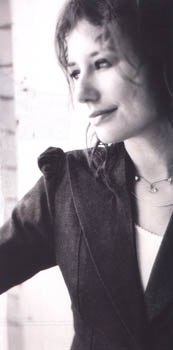

original article
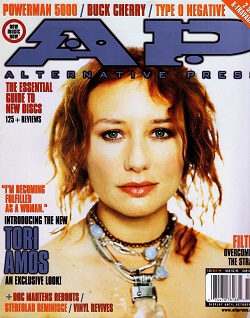 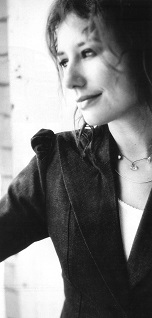
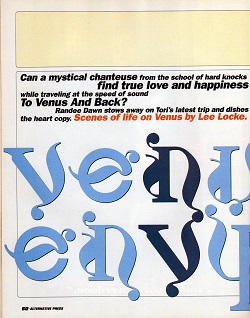 
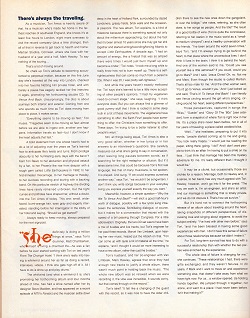 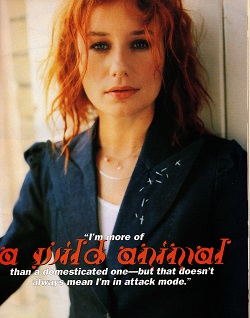
 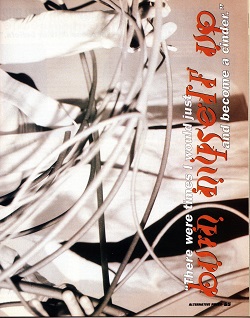
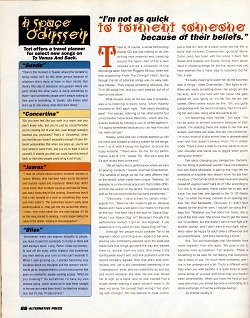 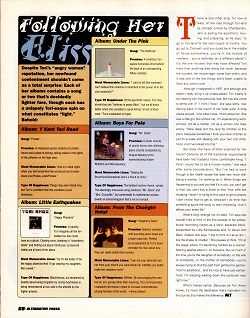
[scans by Sakre Heinze]
t o r i p h o r i a
tori amos digital archive
yessaid.com
|